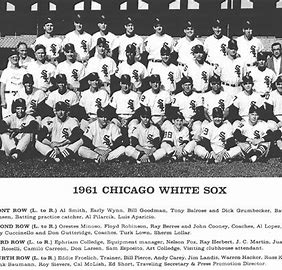The 1961 Chicago White Sox season was the team’s 61st season in the major leagues, and its 62nd season overall. They finished with a record of 86–76, good enough for fourth place in the American League, 23 games behind the first-place New York Yankees. Their pitching staff surrendered 13 of Roger Maris’s 61 home runs that year, the most of any team. Juan Pizzaro was a bright spot with 14-wins, but the team finished 86-76.
The team lost Earl Averill, Jr. and Jim McAnany to the Los Angeles Angels in the 1960 expansion draft on December 14th, as two new teams joined the American League. The Washington Senators (later to become the Texas Rangers) were the second addition. The Yankees were dominant, winning 109 regular season games, and were chased by the Detroit Tigers with 101 victories. The Baltimore Orioles finished third and the White Sox fourth, 23 games behind New York, after a dismal 33-48 road record.
The Yankees were rebounding after the 1959 season that belonged to Sherm Lollar and the White Sox. Yogi’s team took 12 of 16 games from the Sox in 1961. The Bronx Bombers had finished on top of the American League two years in a row but had unfinished business to attend to in the World Series, the crack of Mazeroski’s lethal bat still a bitter memory. Berra was back to spewing his seemingly unknowing witticisms known as “Yogi-isms,” further endearing his fans. “It ain’t over ’til it’s over; It’s déjà vu all over again; The future ain’t what it used to be; and You can observe a lot by watching,” are four prime examples. Sherm, on the other hand, was never flashy or outspoken.
Yogi was piling on the honors that would someday include fifteen All-Star seasons with eighteen showings, ten World Series championships in fourteen appearances, and three A.L. MVP Awards. He played in more than a hundred games each year for fourteen years, received MVP votes in 15 consecutive seasons, led the star-studded Yankees in RBIs for seven consecutive years, and caught Don Larsen’s historic perfect game in the 1956 Series. He was definitely an impossible challenge for Sherm Lollar to keep up with.
A big factor in the Tiger’s 1961 success was Norm Cash, who admittedly swung an illegal cork bat and debuted with the Sox in June of 1958. He smashed a career-high 41 homers in 1961, led the Tigers to win twelve of eighteen games over his former Chicago teammates, and followed in 1962 with 39 more dingers. He only delivered 18 for the Sox in 1960, before he came into his own. The other big loss was catcher Earl Battey, who went to the Washington Senators in 1960 and then on to the Minnesota Twins in 1961-62, while taking over Sherm Lollar’s Gold Glove domination, with three straight of his own. Aging was becoming a factor in the White Sox roster.
Sherm Lollar drifted towards the bottom of the opening day line-up in the traditional 8 spot. Roy Sievers hit clean-up, as Luis, Nellie, and Minnie filled the slots above him. J.C. Martin, Al Smith and Jim Landis followed, just before Sherm and Early Wynn filled the card.
The “Go-Go-Sox” picked up Wes Covington off waivers, traded him along with Stan Johnson, Bob Shaw and Gerry Staley to Kansas City for Ray Herbert, Don Larsen, Andy Carey, and Al Pilarcik, released Joe Ginsberg, and purchased the contract of Warren Hacker from the Phillies. A lot of names that didn’t add up to much production, although Herbert would show vast improvement in 1962.
Sherm Lollar hit a remarkable .282 in 116 games, showing what a little rest can effectively generate. However, he was no longer a power threat, hitting only 7 home runs with 41 RBIs. Part of his “Go” was gone.
Yogi was still going strong, battling against the Cincinnati Reds in the World Series. He caught four of the five games, hit .273 with a home run, and drew 5 walks in 11 plate appearances. Berra would play in two more World Series and coach in another two before his illustrious career was over. Ralph Houk won his first title as the Yankee skipper. They would continue to haunt the White Sox every October, after eliminating them in September. Sherm was off, as usual this time of year, hunting, fishing, and spending time with his family.
To be continued…

Leave a Reply